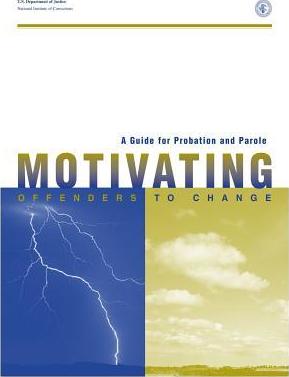A Guide for Probation and Parole: Motivating Offenders to Change

A Guide for Probation and Parole: Motivating Offenders to Change
The corrections field, and community corrections in particular, has long experienced tensions between its two main missions, protecting public safety and rehabilitating offenders. Treatment-oriented strategies that had as their goal the reintegration of offenders into society have contended with deterrence-oriented strategies based on apparent findings that "nothing works" in treating offenders. In recent years, the development and application of evidence-based practices (EBP)-practices informed by the results of scientific research and shown to increase public safety and reduce recidivism-have had a profound and positive impact on the corrections field. More thorough scientific analysis of both treatment- and deterrence-oriented programs has shown that many programs that emphasized motivation and behavior change over punishment have been successful in reducing crime rates among offenders. The National Institute of Corrections (NIC), through its sponsorship of studies and its training programs, has been a leader in the movement toward EBP in the corrections field and an advocate of more rigorous scientific analysis of programs for offenders. One promising evidence-based practice for motivating offenders and fostering positive behavioral changes is motivational interviewing (MI). MI, which was first developed in the addiction treatment field, is now being applied widely and with positive results in corrections, particularly in probation and parole. The principle behind MI is that by listening to offenders and following up on the positive aspects of their speech and thinking, corrections professionals can help increase offenders' motivation to make positive changes in their lives that will reduce their likelihood of reoffending. This publication, Motivating Offenders To Change: A Guide for Probation and Parole, provides probation and parole officers and other correctional professionals with both a solid grounding in the principles behind MI and a practical guide for applying these principles in their everyday dealings with offenders. Through numerous examples of questions, sample dialogues, and exercises, it presents techniques for interacting with offenders at all stages of supervision and at varying levels of commitment to positive change. In addition, it recognizes that deception, resistance to change, and relapse into criminal behaviors are realities for many offenders, and sets forth strategies for dealing with those issues that avoid unproductive c
PRP: 154.92 Lei
Acesta este Prețul Recomandat de Producător. Prețul de vânzare al produsului este afișat mai jos.
123.94Lei
123.94Lei
154.92 LeiLivrare in 2-4 saptamani
Descrierea produsului
The corrections field, and community corrections in particular, has long experienced tensions between its two main missions, protecting public safety and rehabilitating offenders. Treatment-oriented strategies that had as their goal the reintegration of offenders into society have contended with deterrence-oriented strategies based on apparent findings that "nothing works" in treating offenders. In recent years, the development and application of evidence-based practices (EBP)-practices informed by the results of scientific research and shown to increase public safety and reduce recidivism-have had a profound and positive impact on the corrections field. More thorough scientific analysis of both treatment- and deterrence-oriented programs has shown that many programs that emphasized motivation and behavior change over punishment have been successful in reducing crime rates among offenders. The National Institute of Corrections (NIC), through its sponsorship of studies and its training programs, has been a leader in the movement toward EBP in the corrections field and an advocate of more rigorous scientific analysis of programs for offenders. One promising evidence-based practice for motivating offenders and fostering positive behavioral changes is motivational interviewing (MI). MI, which was first developed in the addiction treatment field, is now being applied widely and with positive results in corrections, particularly in probation and parole. The principle behind MI is that by listening to offenders and following up on the positive aspects of their speech and thinking, corrections professionals can help increase offenders' motivation to make positive changes in their lives that will reduce their likelihood of reoffending. This publication, Motivating Offenders To Change: A Guide for Probation and Parole, provides probation and parole officers and other correctional professionals with both a solid grounding in the principles behind MI and a practical guide for applying these principles in their everyday dealings with offenders. Through numerous examples of questions, sample dialogues, and exercises, it presents techniques for interacting with offenders at all stages of supervision and at varying levels of commitment to positive change. In addition, it recognizes that deception, resistance to change, and relapse into criminal behaviors are realities for many offenders, and sets forth strategies for dealing with those issues that avoid unproductive c
Detaliile produsului










